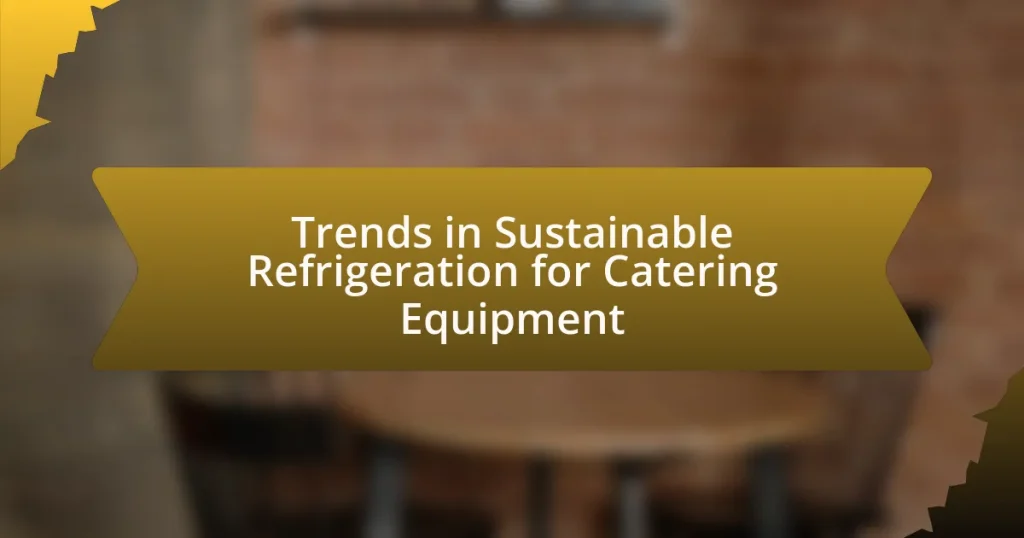Custom catering solutions for dietary restrictions are specialized meal options designed to accommodate various dietary needs, including allergies, intolerances, and lifestyle choices such as veganism or gluten-free diets. These solutions involve careful planning, ingredient selection, and consultation with clients to create tailored menus that ensure safety and satisfaction for all guests. The article explores the importance of custom catering for events, the types of dietary restrictions commonly accommodated, and the key components involved in effective menu planning. Additionally, it addresses challenges faced by caterers, best practices for ensuring compliance with dietary guidelines, and the role of communication in delivering successful catering experiences.
What are Custom Catering Solutions for Dietary Restrictions?
Custom catering solutions for dietary restrictions are tailored meal options designed to accommodate specific dietary needs, such as allergies, intolerances, or lifestyle choices like veganism or gluten-free diets. These solutions involve careful planning and ingredient selection to ensure that all guests can enjoy safe and satisfying meals. For instance, a study by the National Restaurant Association indicates that 70% of consumers are more likely to choose a restaurant that offers healthy menu options, highlighting the demand for customized dietary solutions in catering.
How do Custom Catering Solutions address various dietary needs?
Custom catering solutions effectively address various dietary needs by offering tailored menus that accommodate specific restrictions such as gluten-free, vegan, vegetarian, and allergen-free options. These solutions involve consultation with clients to understand their unique dietary requirements, allowing caterers to create customized dishes that meet those needs. For instance, a study by the National Restaurant Association indicates that 70% of consumers are more likely to choose a restaurant that offers healthy options, highlighting the demand for specialized dietary accommodations. By utilizing fresh ingredients and alternative cooking methods, custom catering ensures that all guests can enjoy meals that align with their dietary preferences without compromising on taste or quality.
What types of dietary restrictions are commonly accommodated?
Commonly accommodated dietary restrictions include vegetarian, vegan, gluten-free, dairy-free, nut-free, and low-carb diets. These restrictions are often recognized in catering services to meet the diverse needs of individuals. For instance, a survey by the National Restaurant Association found that 70% of consumers are more likely to choose a restaurant that offers gluten-free options, highlighting the demand for such accommodations. Additionally, the prevalence of food allergies, such as nut allergies affecting approximately 1 in 13 children in the U.S., underscores the importance of providing nut-free options in catering.
How do these solutions ensure safety and satisfaction for clients?
Custom catering solutions for dietary restrictions ensure safety and satisfaction for clients by providing tailored meal options that meet individual dietary needs. These solutions utilize thorough assessments of clients’ dietary restrictions, including allergies and intolerances, to create customized menus that avoid harmful ingredients. For instance, a study published in the Journal of Food Science found that personalized meal planning significantly reduces the risk of allergic reactions, thereby enhancing client safety. Additionally, these catering services often implement strict food handling protocols and staff training to prevent cross-contamination, further ensuring the safety of clients with specific dietary needs. By prioritizing both safety and satisfaction through personalized service and adherence to dietary guidelines, these solutions effectively address the unique requirements of each client.
Why are Custom Catering Solutions important for events?
Custom catering solutions are important for events because they ensure that the diverse dietary needs of attendees are met, enhancing guest satisfaction and inclusivity. Events often host individuals with various dietary restrictions, such as allergies, intolerances, or lifestyle choices like veganism or gluten-free diets. By providing tailored menu options, event organizers can accommodate these needs, which is crucial for creating a welcoming environment. Research indicates that 32% of consumers have dietary restrictions, highlighting the necessity for custom solutions to avoid potential health risks and ensure all guests can enjoy the meal experience.
What impact do dietary restrictions have on guest experience?
Dietary restrictions significantly impact guest experience by influencing satisfaction and comfort levels during events. When guests have specific dietary needs, such as allergies or preferences, their overall enjoyment can be compromised if these needs are not adequately addressed. Research indicates that 30% of individuals with dietary restrictions report feeling anxious about food options at social gatherings, which can detract from their experience. Providing tailored catering solutions that accommodate these restrictions not only enhances guest satisfaction but also fosters inclusivity, ensuring that all attendees feel valued and cared for.
How can Custom Catering enhance the overall event atmosphere?
Custom catering enhances the overall event atmosphere by providing tailored food options that meet the specific dietary needs and preferences of guests. This personalization fosters inclusivity, ensuring that all attendees feel considered and valued, which can significantly elevate their overall experience. For instance, events that offer gluten-free, vegan, or allergen-free choices demonstrate attention to detail and care for guests’ well-being, creating a welcoming environment. Research indicates that when guests enjoy food that aligns with their dietary restrictions, their satisfaction and engagement levels increase, contributing positively to the event’s ambiance.
What are the key components of Custom Catering Solutions?
The key components of Custom Catering Solutions include menu customization, dietary accommodation, ingredient sourcing, and service flexibility. Menu customization allows clients to tailor dishes to specific tastes and dietary needs, ensuring satisfaction and inclusivity. Dietary accommodation is crucial for addressing allergies, intolerances, and preferences, which enhances guest safety and enjoyment. Ingredient sourcing focuses on obtaining high-quality, fresh, and often local ingredients, which can improve flavor and nutritional value. Service flexibility involves adapting to various event formats and client requests, ensuring a seamless catering experience. These components collectively ensure that catering services meet diverse dietary restrictions effectively.
How is menu planning conducted for dietary restrictions?
Menu planning for dietary restrictions is conducted by assessing individual needs and preferences, followed by creating a menu that accommodates those specific requirements. This process involves identifying dietary restrictions such as allergies, intolerances, or lifestyle choices, and then selecting ingredients and recipes that align with these constraints. For instance, a study published in the Journal of Nutrition highlights that personalized meal planning can significantly improve dietary adherence and satisfaction among individuals with specific dietary needs. By utilizing this tailored approach, caterers can ensure that meals are both safe and enjoyable for those with dietary restrictions.
What factors are considered in creating a diverse menu?
Creating a diverse menu involves considering various factors such as dietary restrictions, cultural preferences, ingredient availability, and nutritional balance. Dietary restrictions include allergies, intolerances, and specific diets like vegan or gluten-free, which must be accommodated to ensure inclusivity. Cultural preferences reflect the need to incorporate different cuisines and flavors, appealing to a broader audience. Ingredient availability is crucial, as seasonal and local sourcing can influence menu options and freshness. Lastly, nutritional balance ensures that the menu offers a variety of food groups, promoting health and well-being among consumers.
How do chefs adapt recipes for specific dietary needs?
Chefs adapt recipes for specific dietary needs by substituting ingredients, modifying cooking techniques, and adjusting portion sizes to meet nutritional requirements. For instance, when catering to gluten-free diets, chefs may replace wheat flour with almond or coconut flour, ensuring the dish remains palatable while adhering to dietary restrictions. Additionally, chefs often utilize alternative proteins, such as legumes or tofu, for vegetarian or vegan diets, maintaining the dish’s flavor and texture. This approach is supported by the increasing prevalence of dietary restrictions, with studies indicating that approximately 30% of the population follows some form of restricted diet, highlighting the necessity for chefs to be versatile and knowledgeable in ingredient substitutions.
What role does communication play in Custom Catering Solutions?
Communication is essential in Custom Catering Solutions as it ensures that client needs and dietary restrictions are accurately understood and met. Effective communication facilitates the exchange of information regarding preferences, allergies, and specific requirements, which is crucial for creating tailored menus. For instance, a study by the National Restaurant Association highlights that 70% of customers prefer to communicate their dietary needs directly to caterers to ensure their satisfaction and safety. This direct interaction not only enhances customer trust but also minimizes the risk of errors in food preparation, thereby improving overall service quality.
How can clients effectively communicate their dietary needs?
Clients can effectively communicate their dietary needs by clearly outlining their restrictions and preferences in a detailed manner. This includes specifying any allergies, intolerances, or dietary preferences such as vegetarian, vegan, gluten-free, or low-carb. Providing this information in writing, such as through a form or email, ensures clarity and reduces the risk of miscommunication. Additionally, clients should engage in direct conversations with catering providers to discuss their needs, allowing for questions and clarifications. Studies show that clear communication significantly improves satisfaction in catering services, as it helps providers tailor their offerings to meet specific dietary requirements.
What questions should clients ask their caterers?
Clients should ask their caterers about their experience with dietary restrictions. This includes inquiries such as: “What specific dietary restrictions can you accommodate?” and “Can you provide examples of menu items that cater to these restrictions?” Additionally, clients should ask about the procedures in place to prevent cross-contamination, such as “How do you ensure that allergens are not mixed with other foods?” and “What training do your staff receive regarding dietary restrictions?” These questions are crucial as they help clients assess the caterer’s capability to meet specific dietary needs, ensuring a safe and enjoyable dining experience for all guests.
What are the challenges faced in Custom Catering Solutions?
Custom catering solutions face several challenges, primarily related to dietary restrictions and preferences. One significant challenge is ensuring food safety and preventing cross-contamination, especially for allergens like nuts, gluten, and dairy, which can pose serious health risks. Additionally, accurately understanding and accommodating diverse dietary needs, such as vegan, vegetarian, or gluten-free diets, requires careful planning and ingredient sourcing. Another challenge is managing client expectations while balancing cost and quality, as custom menus can lead to increased expenses. Furthermore, logistical issues, such as timely delivery and maintaining food temperature, complicate the execution of custom catering services. These challenges necessitate effective communication, thorough planning, and a strong understanding of food safety regulations to ensure successful outcomes in custom catering.
How do caterers manage cross-contamination risks?
Caterers manage cross-contamination risks by implementing strict food safety protocols, including the use of separate equipment and utensils for different food types. This practice minimizes the likelihood of allergens or pathogens transferring from one food item to another. Additionally, caterers often designate specific preparation areas for allergenic ingredients and train staff on proper hygiene practices, such as frequent handwashing and the use of gloves. These measures are supported by guidelines from food safety organizations, which emphasize the importance of preventing cross-contamination to protect consumers, particularly those with dietary restrictions.
What practices are essential for maintaining food safety?
Essential practices for maintaining food safety include proper handwashing, cooking food to safe temperatures, preventing cross-contamination, and storing food at appropriate temperatures. Handwashing with soap and water for at least 20 seconds reduces the risk of foodborne illnesses by eliminating harmful bacteria. Cooking food to the recommended internal temperatures, such as 165°F for poultry, ensures that pathogens are killed. Preventing cross-contamination, such as using separate cutting boards for raw meat and vegetables, minimizes the risk of spreading bacteria. Finally, storing food at safe temperatures, below 40°F for refrigeration and above 140°F for hot holding, helps inhibit bacterial growth. These practices are supported by guidelines from the Centers for Disease Control and Prevention, which emphasize their importance in food safety.
How can caterers ensure compliance with dietary guidelines?
Caterers can ensure compliance with dietary guidelines by thoroughly understanding and implementing specific dietary requirements for their clients. This involves conducting detailed consultations to identify individual dietary restrictions, such as allergies, intolerances, and preferences, which can include vegetarian, vegan, gluten-free, or low-sodium diets.
Additionally, caterers should maintain up-to-date knowledge of dietary guidelines established by health organizations, such as the Dietary Guidelines for Americans, which provide evidence-based recommendations for nutrition. By utilizing this information, caterers can create menus that align with these guidelines, ensuring that meals are not only compliant but also nutritious.
Furthermore, proper training for staff on food preparation and handling is essential to prevent cross-contamination and ensure that dietary restrictions are respected. Implementing standardized recipes that adhere to dietary guidelines can also help maintain consistency and compliance across different events.
What are common misconceptions about Custom Catering Solutions?
Common misconceptions about Custom Catering Solutions include the belief that they are only for large events, that they are prohibitively expensive, and that they lack variety in menu options. Many people assume that custom catering is only necessary for weddings or corporate functions, but it can also be tailored for smaller gatherings and personal events. Additionally, while some custom catering services may have higher costs, many offer flexible pricing to accommodate different budgets. Lastly, the idea that custom catering is limited in menu diversity is inaccurate; many providers specialize in creating diverse and inclusive menus that cater to various dietary restrictions and preferences, ensuring that all guests can enjoy the meal.
Why do some people believe Custom Catering is too expensive?
Some people believe Custom Catering is too expensive due to the perception that personalized meal options and specialized dietary accommodations significantly increase costs. This belief is often reinforced by the fact that custom catering services typically require higher-quality ingredients, skilled chefs, and more extensive planning compared to standard catering options. Additionally, the need for tailored menus to meet specific dietary restrictions can lead to increased labor and preparation time, which further drives up the overall expense.
How can caterers dispel myths about dietary accommodations?
Caterers can dispel myths about dietary accommodations by providing clear, factual information about the options available and actively engaging with clients to address their concerns. For instance, many people believe that dietary accommodations are too complicated or expensive; however, studies show that 60% of caterers report successfully managing dietary restrictions without significant cost increases. By showcasing successful case studies and offering sample menus that highlight diverse dietary options, caterers can demonstrate the feasibility and benefits of accommodating various dietary needs. Additionally, hosting informational sessions or workshops can further educate clients and debunk misconceptions, fostering a more inclusive catering environment.
What best practices should be followed for successful Custom Catering?
Successful custom catering requires thorough planning, clear communication, and attention to dietary restrictions. First, caterers should conduct a detailed consultation with clients to understand their specific needs, preferences, and any dietary restrictions of guests. This ensures that the menu is tailored appropriately.
Next, it is essential to source high-quality ingredients that accommodate various dietary needs, such as gluten-free, vegan, or allergen-free options. This practice not only enhances the quality of the food but also demonstrates a commitment to inclusivity.
Additionally, maintaining flexibility in menu options allows for adjustments based on guest feedback or last-minute changes. This adaptability can significantly improve client satisfaction.
Finally, effective presentation and service are crucial. Well-presented dishes that are served at the right temperature can elevate the dining experience, making it memorable for guests.
By following these best practices, custom catering can successfully meet diverse dietary needs while ensuring a positive experience for all attendees.
How can clients ensure their dietary needs are met effectively?
Clients can ensure their dietary needs are met effectively by clearly communicating their specific dietary restrictions and preferences to their catering service. This communication allows the catering team to tailor menus that accommodate individual needs, such as allergies, intolerances, or dietary choices like veganism or gluten-free diets. Research indicates that effective communication between clients and service providers significantly enhances satisfaction and compliance with dietary requirements, as seen in studies on food service management.
What tips can caterers implement to improve service for dietary restrictions?
Caterers can improve service for dietary restrictions by implementing clear communication, menu customization, and staff training. Clear communication involves discussing dietary needs with clients prior to events to ensure all restrictions are understood and accommodated. Menu customization allows caterers to create dishes that cater to specific dietary needs, such as gluten-free, vegan, or nut-free options, ensuring that all guests have suitable choices. Staff training is essential to educate employees about dietary restrictions, cross-contamination risks, and proper food handling practices, which enhances overall service quality and guest safety. These strategies are supported by industry best practices that emphasize the importance of inclusivity in catering services.



